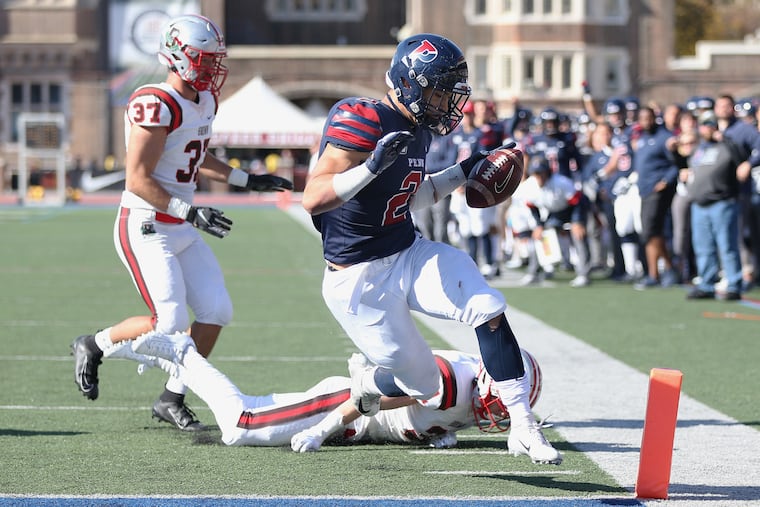Ivy League won’t have any fall semester sports
The Ivies are the first Division I league to make this call. Coaches were informed by their schools Wednesday afternoon.

It’s official: No varsity sports in the Ivy League for the fall semester.
The Ivy is the first Division I league to make this call.
No football, for instance, and no soccer -- and no non-league basketball games during the first semester.
In a phone interview, Penn athletic director Grace Calhoun said the league hasn’t ruled out any fall sports’ being played in the spring; all that is to be determined.
Also, the league athletic directors are seeking clarification from Ivy presidents about whether there can be games or other competitions in between the fall and spring semesters.
“Practice and other athletic training opportunities for enrolled student-athletes will be permitted provided they are structured in accordance with each institution’s procedures and applicable state regulations,‘‘ the Ivy League announced in a statement Wednesday evening.
“The Ivy League will also issue guidelines on a phased approach to conditioning and practice activities to allow for interaction among student-athletes and coaches that will begin with limited individual and small group workouts and build to small group practice sessions, if public health conditions permit.”
The statement also said that fall sport student-athletes “will not use a season of Ivy League or NCAA eligibility in the fall, whether or not they enroll. Students who wish to pursue competition during a fifth year will need to work with their institutions in accordance with campus policy to determine their options beyond their current anticipated graduation date.”
In other words, since the Ivy League doesn’t allow graduate students to compete in sports, do they take classes or hold off?
“A decision on the remaining winter and spring sports competition calendar, and on whether fall sport competition would be feasible in the spring, will be determined at a later date,‘' the Ivy statement said.
This wasn’t the only big COVID-19-related news in college sports Wednesday. On the West Coast, Stanford announced it is dropping 11 sports at the end of the 2020-21 academic year.
No more men’s and women’s fencing, field hockey, lightweight rowing, men’s rowing, co-ed and women’s sailing, squash, synchronized swimming, men’s volleyball, and wrestling.
This news highlights how dramatically the landscape could shift if sports revenues fall off a cliff. Calhoun said the Ivy League is working on a “phasing” plan much like the broader red, yellow, and green phases used by governments, to work on what can be allowable in sports in each phase.
Within the Ivies, sports plans had to account for all sorts of different campus fall plans. Penn’s fall plan, announced June 25, has all undergraduates on campus but all sorts of restrictions. Large lectures, for instance, will be online.
Last week, Yale announced it would reopen in the fall without sophomores living on campus and then will be open in the spring without freshmen living on campus. Princeton is going with freshmen and juniors living on campus in the fall and sophomores and seniors in the spring.
Harvard announced it will have no in-class learning for the entire academic year, fall and spring, but will have up to 40% of its undergraduates in residence, prioritizing freshmen in the fall and seniors in the spring.
While the Ivy is the first D1 league to make this call, it is not the first in the country. The Centennial Conference, which includes Haverford, Bryn Mawr, Swarthmore, and Ursinus locally, made the same call earlier this week.
While the league works to make these decisions by consensus, Calhoun said the league had voted earlier in the midst of this pandemic that if at least three schools were able to compete, “we will declare a champion.”
Asked about whether she expects other conferences to follow a similar path regarding fall sports, Calhoun, who also is the current chair of the NCAA Division I council, said, “I do. We don’t claim that we have this figured out more broadly. But I think others are going to look at the trend data and say, this makes perfect sense.”
By that, Calhoun mentioned the data on positive COVID-19 tests going up around the country, and also the advice from health experts about all we still don’t know of the future health ramifications of the virus. Calhoun used the term “social contract” in how “the only way this really works is if everyone works together.”
In sports, she said, competition “requires too many things that go against our campus policy, in terms of size of gatherings, travel, visitors to campus. All of that.”
Just as was the case in deciding for the fall, the league will wait as long as possible in deciding about the spring, with the understanding that there is a need to ramp up in advance.
“If numbers are trending the right way, no one wants to compete as much as we do,‘' Calhoun said.